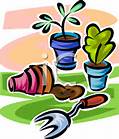It is easy to start a compost heap anytime of the year but late summer to early winter is the peak time for composting. At this time of year there is a lot of end of season garden waste to dispose of which can be the basis of composting.
Compost is a collection of food and plants that decomposes over several months before finally turning into humus which is an extremely nutrient-rich soil. Generally speaking you only need three things to start: water, browns and greens.
Browns refers to tree matter, like dead leaves, flowers, stems and twigs. Greens refers to grass cuttings, food waste. potato peel, fruit, vegetables and tea and coffee grounds.
Never put meat, dairy, bread or left over cooked meals in the compost as these would attract vermin.
Making compost is not difficult, just follow these instructions.
- Select a container. The local council will advise you on this. It should be placed on a grassy, relatively shady part of the garden. It should have no bottom so that the compost heap is touching the ground. Pile a few inches of branches at the bottom to help aerate the heap. Air flow is critical to stop the compost getting too wet and therefore smelling.
- A general rule is that the smaller the ingredients the quicker it will break up, so chop or break any big chunks. The ingredients for a successful compost heap are an equal balance of nitrogen -found in green materials, carbon in the brown matter and water. So start putting your dried leaves, grass clippings fruit, vegetables, dust from vacuuming, old herbs and spices, shredded news paper, human and pet hair, old wine and wine corks in the compost instead of your green bin.
- If you notice it is not decomposing or looking dry, add a little water.
- Once a week aerate the pile slightly by using a spade to mix the materials around.
The compost should be ready to use after a few months when it will be warm to the touch, develops an earthy smell and turns to a dark brown colour. This is one of the most powerful ingredients to feed the garden and making it helps with re-cycling waste.
Hazel Wyatt

 RSS Feed
RSS Feed
